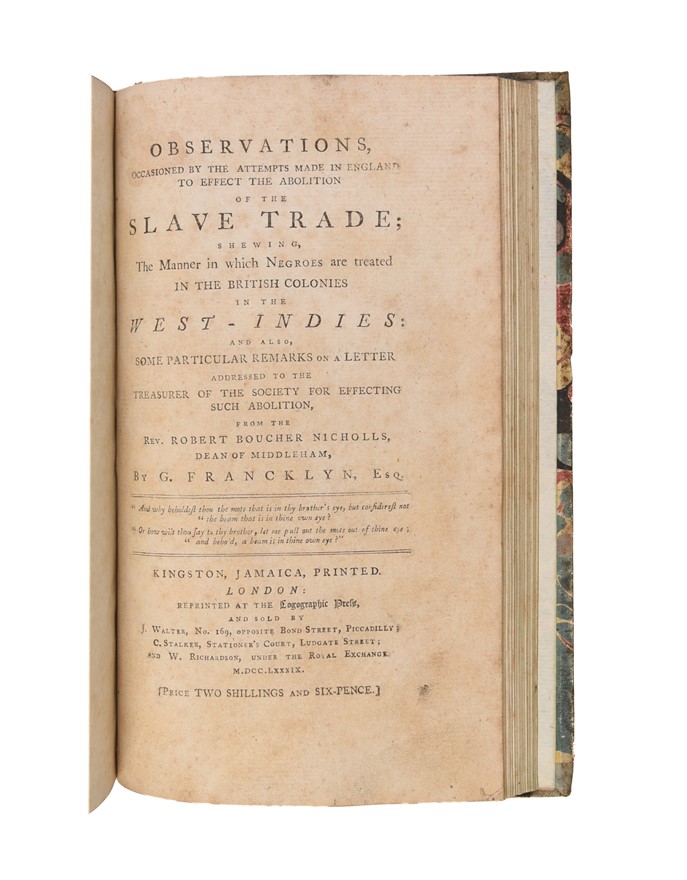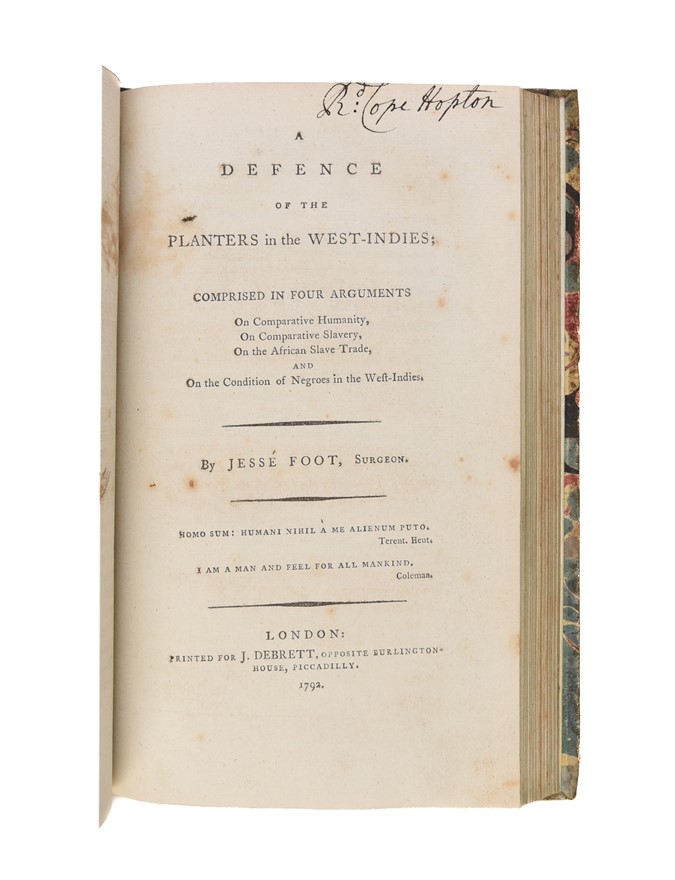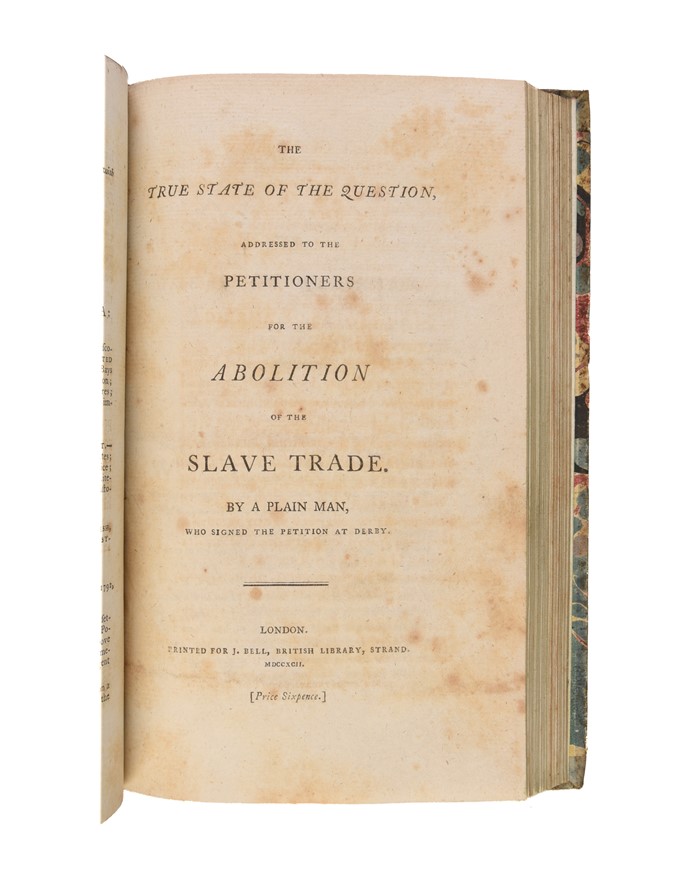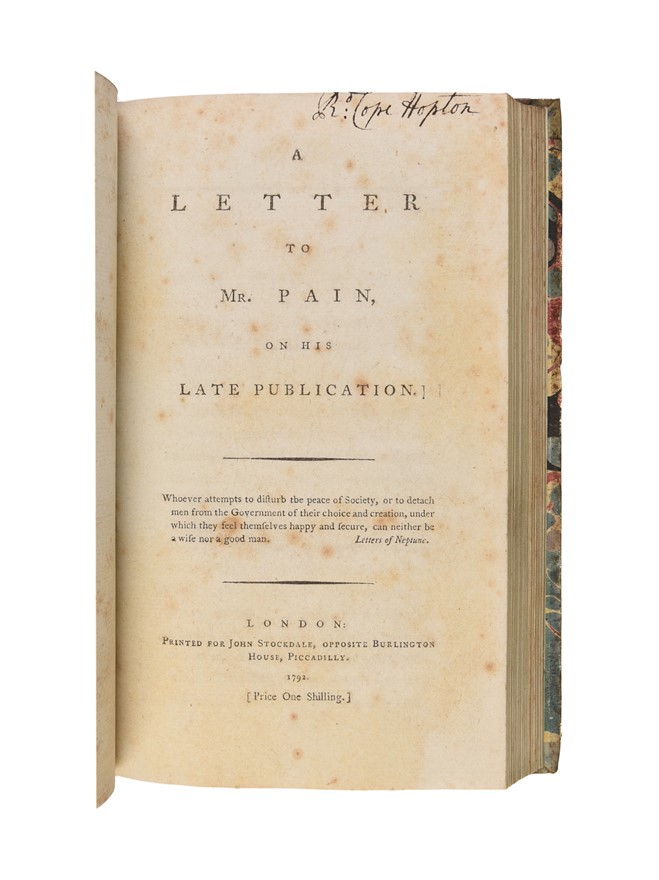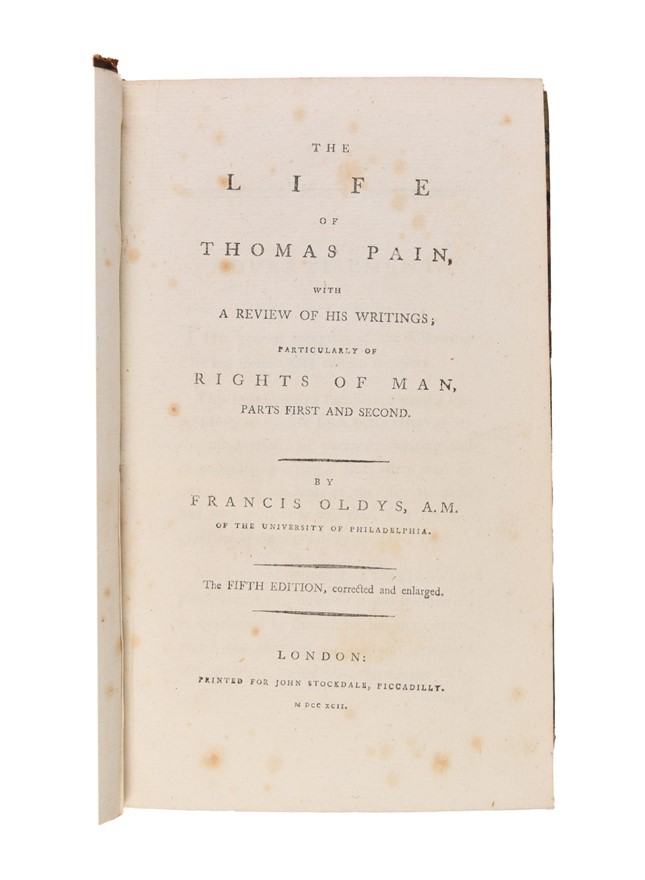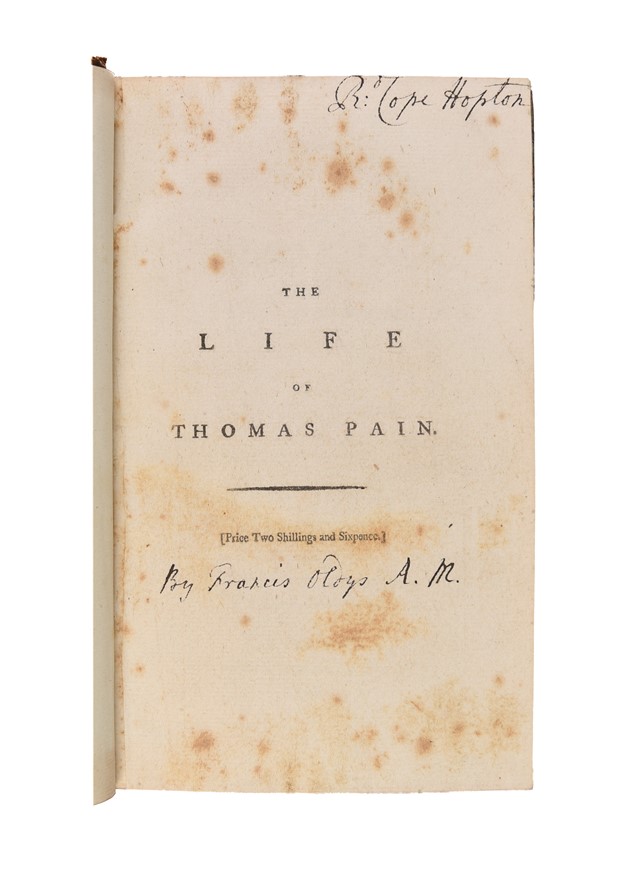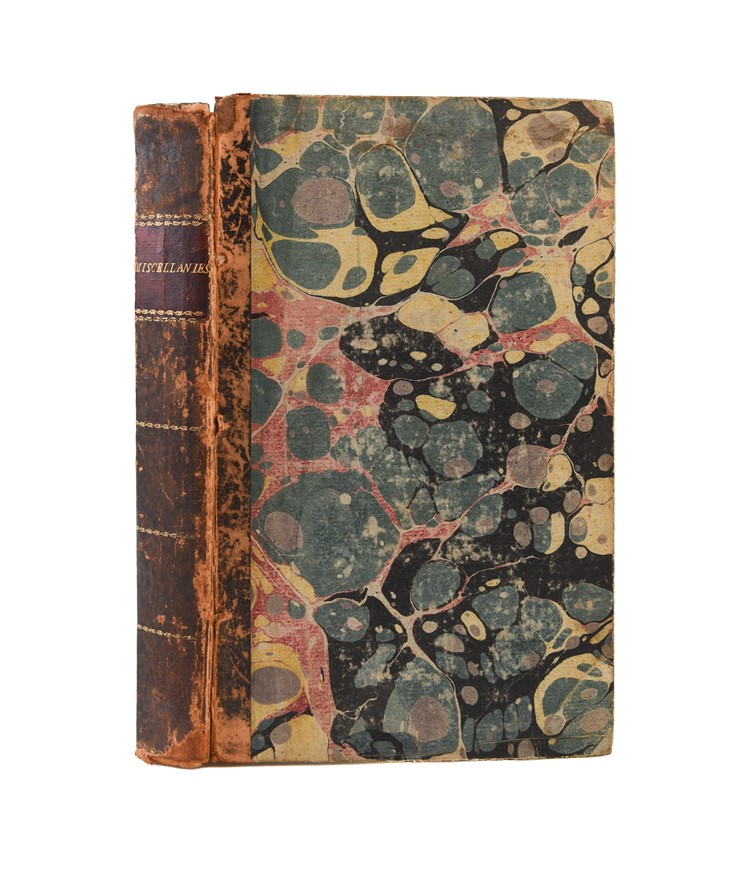Buff; or, a Dissertation on Nakedness: A Parody on Paine's Rights of Man.
PAINE Thomas (1792)
£5000.00 [First Edition]
Please contact us in advance if you would like to view this book at our Curzon Street shop.
"THE GRAND CHORUS OF THE RIGHTS OF MAN IS CHANGED INTO A CAZONETTA ON NAKEDNESS"
First Edition. 8vo (210 x 130). 27, [1] pp. Spotted on the title-page and in a few places throughout. Late 18th-century calf-backed marbled boards, smooth spine tooled in gilt, red leather and gilt label, plain endpapers (joints split but holding firm, spine a little worn, headcaps worn).
London: by J. Mathews,
Rare. OCLC records BL and National Library of Scotland (microfilm); Huntington, UC-Berkeley and American Philosophical Society. The last copy recorded on Rare Book Hub was asold t Anderson Galleries in New York in 1922 ("Author's presentation copy" - but annoyingly it did not name the anonymous author.)
"Is there one, but what is worse, much more destructive to the rights of and liberties of man than the coat": a satirical parody of Paine's Rights of Man, in which the author uses Paine's own words - with italicised new insertions - to alter his revolutionary arguments into a call for public nakedness. A very nice copy bound in an anti-Paine related and pro-slavery contemporary pamphlet volume.
In the introduction the anonymous author sets out the simple but amusingly effective way in which Paine's own writing is used against him:
"Mr Paine's discussion of the Rights of Man, affords all that is necessary to a discussion of Nakedness: slight alterations fit it for the latter, as well as it is now fitted for the former; and it would require very little literary legerdemain to fit it for any subject." (p.3)
The work then uses excerpts from Paine's actual text mixed with short passages in italics (by the anonymous author) which turns the text into an argument for nakedness. The text begins:
"So deeply rooted in the practice of covering human nakedness, is the old world, and so effectually has the tyranny and the antiquity of habit established itself over the mind, that we know not where to begin, to reform the swaddled condition of man." (p.5).
And continues in the same way:
"Nothing can appear more contradictory than the principles on which the old system of dress began, and the condition to which the new system called Buff is capable of carrying mankind. Dress on the old system is destruction to all the varieties of our nature, because it exhibits man in one uniform and unvaried appearance.." (p.11-12)
The author picks-up on Paine's arguments and twists them:
"All hereditary forms of dress are in their nature tyranny, an heritable coat, or an heritable great coat, or an heritable surtout coat, or by whatever other fanciful name such things may be called, have no other significant explanation than that mankind are heritable property." (p.13-14).
Continuing:
"This Popery of dress, like the ecclesiastical Popery of old has had its day, and is hastening to its exit. The shirt, and the coat, the antiquated toga, and the ragged breeches, will moulder together." (p.21)
America and native Americans are repeatedly evoked:
"The Indians of America are on a plan that excludes those childish embarrassments. No suspension of dress can there take place for a moment, from any circumstances whatever. Buff provides for every thing, and is the only system in which nations can always appear in their proper character, Clothes would not have continued so many ages in the world, had it not been for the deformities they cover" (p.24-6)
Paine's own work first appeared in the same year and was a controversial (and commercial) success selling thousands of copies and provoking an enormous number of replies, criticisms and examinations. The present satire on Paine though is unusual and rare and works to undermine the powerful authoritative style of The Rights of Man. The American Philosophical Society library catalogue suggests that the pamphlet may be written by William Roberts (barrister and writer, 1767-1849).
Bound in a contemporary pamphlet volume with: 1. OLDYS (Francis) [i.e. CHALMERS (George)]. The Life of Thomas Pain [sic], with a Review of his Writings; particularly of Rights of Man. ... By Francis Oldys, A. M. of the University of Philadelphia. ...Fifth Edition. Foxed in a few places throughout. A pseudonymous and highly critical biography of Paine. 2. A Letter to Mr. Pain [sic] on his Late Publication. London: for John Stockdale, 1792. First Edition. xi, [1], 31, [1, advertisement]pp. Title-page and final leaf foxed. Rare. OCLC records physical copies at NLS, University of London; Huntington, Yale and Michigan. 3. The True State of the Question, addressed to the Petitioners for the Abolition of the Slave Trade. By a Plan Man who signed the Petition at Derby. First Edition. 14, [2, blank]pp. Title-page rather browned and some foxing and spotting throughout. London: for J. Bell, 1792. A shocking pamphlet which argues that slaves are treated well on the American plantations ("some of them are at times whipped; but generally for crimes for which in England they would be hanged") and that the abolitionists in England are simply misinformed about the conditions. With "testimonies" by various individuals on the supposedly superior and comfortable conditions in which the black slaves live ("in a word, they generally declared they thought them better off than the labouring Poor in this Country".) 4. Buff; or, A Dissertation on Nakedness [see above]. 5. FOOT (Jesse). A Defence of the Planters in the West-Indies. First Edition. iv, 101, [1, blank]pp. Title-page a little foxed. London: for J. Debrett, 1792. 6. FRANCKLYN (Gilbert). Observations, occasioned by the attempts made in England to effect the abolition of the Slave Trade. First Edition. xx, 87, [1, advertisement]pp. First and final leaf rather foxed and browned. London: Logographic Press, 1789.
Provenance: Richard Cope Hopton of Canon Frome, Herefordshire (1738-1810), armorial bookplate on the front pastedown and signature "R^d^ Cope Hopton" on the half-title/title of most of the pamphlets; manuscript contents leaf in the same hand on the initial flyleaf.
Stock Code: 252791

